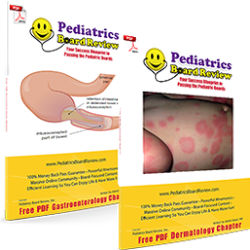Ultimate Guide to the MOCA-Peds Exam
The MOCA-Peds exam is the default option to meet your Part 3 requirement within each five-year MOC cycle. Pediatricians have found MOCA-Peds preferable to the ponderous and stressful standard proctored exam. MOCA-Peds (Maintenance of Certification Assessment – Pediatrics) may seem like an easier option, however, you’ll still need to study with efficiency. PBR can prepare you in an easy and painless way. We give you brief, targeted summaries of the exact topics you will see on the exam.
How Hard is it to Study for the MOCA-peds?
It’s not hard as long as you have the right resources. To become familiar with the content, we recommend the MOCA-PBR Study Guide & Test Companion. Remember, you’ll have access to the open-book and open-computer resources of your choosing. Be sure to use the right resources for you.
How to Study for the MOCA-Peds Exam?
- Locate the American Board of Pediatrics topics for this year
- Find a high quality guide, such as the MOCA-PBR, for this year’s MOCA-Peds topics
- Review Your Study Guide at Least Once From Beginning to End
- Have the Online Version of your MOCA-Peds study guide available during testing
- Review the one-page list of topics on the day that you attempt MOCA-Peds questions
- Have the online version of your MOCA-Peds study guide available during testing
- Use all available open-book resources to answer each question within 5 minutes
- Take notes on questions you missed because they may repeat in future quarters
- Repeat this process for every MOCA-Peds exam
After you’ve reviewed the steps, you will undoubtedly have more questions. Our Reminders can help.
Locate the American Board of Pediatrics Topics for This Year
The topics change every year, but they are released in advance. You can typically locate them by clicking here. Trying to research every topic can be grueling as a full-time physician, which is why we recommend that you use a structured study guide to help you prepare.
Find a High Quality Guide, such as the MOCA-PBR, For This Year’s MOCA-Peds Topics
We recommend the MOCA-PBR Study Guide & Test Companion. PBR reviews the new topics and creates a new, high-quality study guide every single year. It's created with efficiency in mind so you can easily find the answers you're looking for.
Review Your Study Guide at Least Once From Beginning to End
Go through your complete study guide at least once toward the beginning of the year. This will give you a solid foundation for the questions that you will encounter over the four quarterly exams.
Free MOCA-Peds Topic Summaries!
Have the Online Version of your MOCA-Peds Study Guide Available During Testing
The MOCA-Peds exam is open-book and open-computer. Keep your study resources handy!
Study Pro-Tip: If this year’s list of topics includes migraines, when you come across a patient with a headache, you can keep migraines at the top of your differential. This kind of test-taking strategy is considered key in passing the MOCA-Peds exams.
Review the One-Page list of Topics On the Day That You Attempt MOCA-Peds Questions
A quick scan of the MOCA-Peds topics will give you a tremendous edge. By reviewing just the topic names, you will remind yourself of the types of diseases and disorders that you are going to be tested on.
Have the Online Version of your MOCA-Peds Study Guide Available During Testing
Having your online study guide available during your questions will help you quickly find the answers. If you are using the MOCA-PBR Study Guide & Test Companion, the topic summaries are usually only 1-3 pages, and our online search function allows you to quickly find the answers to your questions. If you can’t find the answer in the study guide, use the clickable reference links located at the bottom of each topic summary.
Use All Available Open-Book Resources to Answer Each Question within 5 Minutes
You get a total of 5 minutes per question, and you can use any available resource to help you during the test. Our MOCA-PBR online edition allows you to quickly search for and find the answers to your questions. However, if you cannot find the answer through our study guide and reference links, keep other resources (e.g., UpToDate and Pediatrics In Review) open in additional tabs.
Take Notes on Questions You Missed—They May Repeat in Future Quarters
Be sure to take notes on any MOCA-Peds questions you missed or skipped. Plan to review those notes immediately before you take the next quarter’s questions because they are likely to be presented again if you missed a question or had low confidence in your answer.
Repeat This Process for Every MOCA-Peds Exam
Get ready to do it all again! You’ll need to complete MOCA-Peds for each MOC 5-year cycle, and you’ll need to study efficiently and strategically.
What are the Differences Between the Proctored MOC Exam and MOCA-Peds?
The proctored MOC is a 4-hour exam offered to board-certified pediatricians to fulfill Part 3 of MOC by the American Board of Pediatrics. The MOCA-Peds Assessment is an at-home, self-paced, open book option with approximately 20 questions per quarter which satisfies the same requirements.
Key Details for the MOC:
- Administered in a testing facility
- Closed book, 4-hour exam
- Overseen by an authorized ABP representative
- Can include ANY topic related to pediatrics
- You only have 75 seconds to answer each question
- You pay an additional fee to take this exam
Key Details for MOCA-Peds:
- Open book exam
- Take from your home, office, or anywhere you have online access
- The cost is covered through your maintenance of certification enrollment fees.
- You get 5 minutes per question
- Answer one question per day, or all in one sitting.
How Do You Prepare For MOCA-Peds?
There is good news with MOCA-Peds! The ABP provides Learning Objectives and Featured Readings in advance. This “sneak peek” offers a huge advantage—you now have the ability to study the exact diseases and disorders that you will be tested on through MOCA-Peds.
Pro-Tips for MOCA-Peds:
- Do NOT “wing it.” A goose chase with Google, UpToDate, Pediatrics in Review, and other online resources within the five-minute window will result in dead ends, anxiety, and failure.
- Also NOT recommended: Poking around for resources related to the Learning Objectives and Featured Readings. Yes, you can study on your own with a lot of individual research, but oftentimes, this method yeilds a fruitless, frustrating, and unfocused hunt.
- We Recommend: The MOCA-PBR Study Guide & Test Companion — online and/or hardcopy format. Each year we do the work and research for you. We dive deep into the ABP Learning Objectives and Featured Readings the moment they are published. This allows us to build concise study guides to capture the common and uncommon information that may be covered on the exam. Use the MOCA-PBR Study Guide and Test Companion as your resource tool. Our efficiency-focused online resources make it easy to search, easy to answer questions efficiently, and easy to PASS your MOCA-Peds exams.
What Happens if You Fail MOCA-Peds?
If you fail a MOCA-Peds quarterly assessment, nothing happens right away. Certification is maintained by passing at least 12 quarterly assessments within the first 4 years of your 5-year cycle. If you do not pass at least 12 quarters by the end of your fourth year, then you must pass the proctored exam by the end of the 5-year cycle.
Failure to meet your recertification requirements is a big deal, and will result in loss of your status as a board-certified physician and possibly the loss of your job. Many hospitals and clinics will only employ board-certified pediatricians.
Please don’t be discouraged—there is a clear-cut road to PASSING. With these high-yield tips and the MOCA-PBR Study Guide & Test Companion, you can PASS the exams easily!
What Else Do I Need to Know about MOCA-Peds?
Fast Facts
- The MOCA-Peds Assessment is greatly preferred for its format and flexibility.
- Answer approximately 20 questions per quarter, every quarter, for the first 4 years of your MOC cycle (16 quarters of questions).
- You must pass at least 12 quarters to meet your MOC Part 3 (Exam) requirement.
- The ABP will drop your 4 lowest-scoring, or skipped, quarters. Your score can only go up or stay the same.
- If you get 100% for the first 12 quarters, you will have PASSED/satisfied your Part 3 requirement, and you will not have to go through MOCA-Peds for your 4th year.
- You’ll see your raw scores (percentage of questions answered correctly) immediately after you complete each question.
- Scaled scores, which consider the difficulty of test questions, are updated annually in mid-January.
- You can answer one question at a time, or all of them in one sitting.
- You get 5 minutes per question.
- Take the exam at home, in the office, on your mobile device, or any place with internet access without a proctor.
- You have the freedom to access the MOCA-PBR Study Guide & Test Companion, UpToDate, Pediatrics in Review, or other resources in this open-book test.
- You’ll study a targeted number of topics selected by the American Board of Pediatrics (ABP) for the year. Instead of studying everything in the world of pediatrics, you only have to study the Learning Objectives and Featured Readings chosen by ABP. The 80 questions per year come from these study topics, and each year we create a new MOCA-PBR Study Guide & Test Companion to cover the new Learning Objectives and Featured Readings.
What are MOCA-Peds “Learning Objectives” and “Featured Readings”?
The American Board of Pediatrics provides approximately 40 Learning Objectives and up to 5 Featured Readings. Learning Objectives are the areas of pediatrics that you will need to read, study, and absorb. Featured Readings are typically medical journal articles or guidelines that you will also need to read. Learning Objectives and Featured Readings are usually published on the ABP website in the fourth quarter of the previous year.
Some examples of prior MOCA-Peds Learning Objectives include:
- Differentiate between normal and abnormal variations in head growth and manage appropriately.
- Evaluate and manage a child with an inguinal mass.
Some examples of prior Featured Readings include:
- Management of Infants at Risk for Group B Streptococcal Disease. Pediatrics. 2019.
- Acute Treatment of Migraine in Children and Adolescents: Report of the Guideline Development, Dissemination, and Implementation Subcommittee of the American Academy of Neurology and the American Headache Society. Neurology. 2019.
Are you ready to take on MOCA-Peds?
At Pediatrics Board Review, we know MOCA-Peds. We created the first-ever MOCA-Peds study guide, and we have pioneered newer, faster, and more effective study strategies to help pediatricians just like you.
Our job is to help you study efficiently and worry less. In fact, we believe so strongly in our proven track record to help our members pass that we put a Money Back First-Time Pass Guarantee on it.
Ready to go for that clear-cut PASS? Then what are you waiting for?




